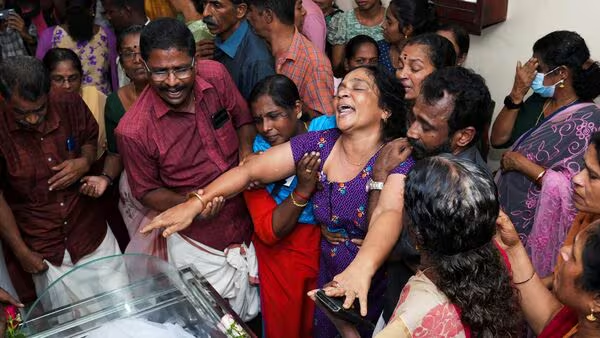In the wake of a tragic fire in Kuwait that claimed the lives of 50 Indian nationals, including 24 from Kerala, the Union government’s decision to deny political clearance to Kerala Health Minister Veena George for a visit to the Gulf nation has sparked a political storm. The decision has drawn criticism from Kerala’s ruling Left Democratic Front (LDF) and the opposition Congress, who accused the Centre of blocking the state’s humanitarian efforts.
Kerala Minister’s Plan to Visit Kuwait Blocked
Following the devastating fire in Mangaf city, Kuwait, the Kerala government had proposed sending Health Minister Veena George and State Mission Director (NHM) Jeevan Babu to the Gulf country. The visit was intended to oversee relief efforts, assist in the treatment of the injured, and help coordinate the repatriation of the deceased’s bodies to India.
However, the Ministry of External Affairs (MEA) denied the required political clearance, preventing them from traveling. The refusal has led to widespread criticism, particularly from the Kerala government, which views the denial as unnecessary interference in state affairs.

Speaking on the matter, Minister Veena George expressed her disappointment. “It is very unfortunate that we did not get permission to visit Kuwait. More than half of the victims in this tragedy were from Kerala. Many of the injured people receiving treatment are also Keralites. Our presence in Kuwait would have helped speed up relief efforts and ensure proper care for our people,” she said.
Chief Minister Pinarayi Vijayan Reacts to the Centre’s Move
Kerala Chief Minister Pinarayi Vijayan also responded to the Centre’s decision, expressing his dissatisfaction but choosing to focus on ongoing relief efforts. “Though I have a strong opinion on the Centre’s decision, this is not the time to debate the issue. Our priority is to ensure that the victims’ families receive proper assistance and that the injured are given the best possible medical care,” he stated.
The Chief Minister had earlier urged the Centre to take necessary steps to bring back the bodies of those who lost their lives in the fire and ensure adequate medical support for the injured. However, he refrained from making direct accusations against the Union government, stating that he wanted to maintain unity during this difficult time.
Congress Slams the Centre’s Decision
The Congress party, the principal opposition in Kerala, strongly criticized the Centre for blocking the minister’s visit. Leader of Opposition V D Satheesan termed the move “unfortunate” and accused the Union government of acting with political bias.
“A representative of the state government would have helped improve coordination between Kerala and Kuwait officials. The state’s presence would also have supported the Union government’s relief efforts. This was a moment to set aside political differences and work together, but unfortunately, the Centre has taken a different approach,” Satheesan said.
Other Congress leaders also echoed similar sentiments, questioning why Kerala was being prevented from sending its representatives to assist citizens affected by the tragedy.
BJP Defends the Union Government’s Stand
On the other hand, the Bharatiya Janata Party (BJP) in Kerala defended the Centre’s decision, stating that there was no need for a state minister to visit Kuwait when the Union government had already taken control of the situation.
BJP state president K Surendran said, “The Ministry of External Affairs has already sent a Union minister to Kuwait to coordinate the relief work. The situation is under control, and all necessary measures are being taken. The Kerala government’s attempt to send a delegation was not essential, and creating a controversy over it is unnecessary.”
Surendran further accused the LDF of politicizing a sensitive issue for political gain and attempting to undermine the Union government’s efforts.
Governor Arif Mohammed Khan Backs Centre’s Decision
Kerala Governor Arif Mohammed Khan also supported the Centre’s decision, questioning the necessity of sending a state delegation when central government representatives were already working on the ground.
“The Government of India has already sent a minister to Kuwait to handle the situation. What additional purpose would a state delegation serve? This is a national issue, and the response should come from the Union government,” he remarked.
His comments further fueled the political debate, with opposition leaders accusing the Governor of aligning too closely with the BJP’s position.
The Kuwait Fire Tragedy and Its Impact
The fire that broke out in a residential building in Kuwait’s Mangaf city was one of the deadliest incidents involving Indian expatriates in recent history. Out of the 50 confirmed fatalities, 24 were from Kerala, highlighting the strong presence of Keralites in the Gulf region.
Hundreds of migrant workers lived in the affected building, most of them employed in low-income jobs. Many of the injured are still undergoing treatment in hospitals, and the process of repatriating the deceased’s bodies has begun.
The Indian government has assured full support to the victims’ families, and Kuwait authorities have launched an investigation into the incident. Initial reports suggest that poor living conditions and inadequate fire safety measures may have contributed to the disaster.
Political Repercussions and the Road Ahead
The Centre’s refusal to allow Kerala’s health minister to visit Kuwait has now turned into a political flashpoint, further intensifying tensions between the state and Union governments.
Critics argue that allowing Kerala’s minister to visit would have strengthened diplomatic ties and ensured that the specific needs of the victims from Kerala were addressed. However, supporters of the Centre’s decision maintain that the Union government is fully capable of handling the crisis without state-level intervention.
The incident raises broader questions about the role of state governments in international crises involving their residents. While the Union government has primary control over foreign affairs, states with significant expatriate populations, like Kerala, often seek direct involvement in crisis management.
For now, the focus remains on relief efforts and supporting the families affected by the Kuwait fire. Despite the political debate, both the Centre and Kerala government continue to coordinate efforts to repatriate bodies and provide aid to the injured.
The tragedy serves as a reminder of the challenges faced by Indian migrant workers in the Gulf and the urgent need for stronger policies to ensure their safety and well-being.
EAM Jaishankar Meets Kuwaiti Leaders to Strengthen Bilateral Ties



